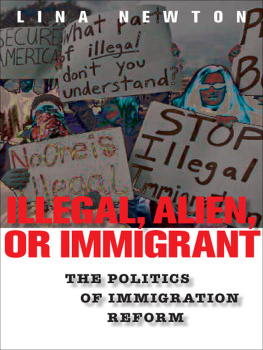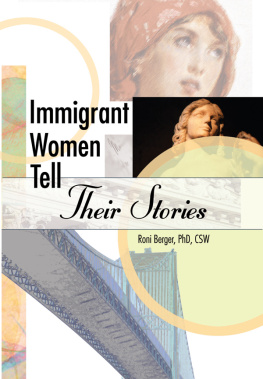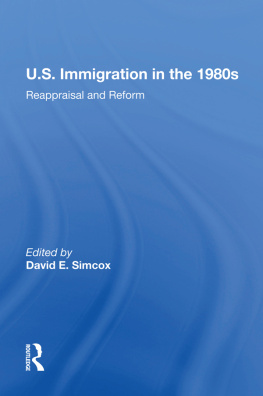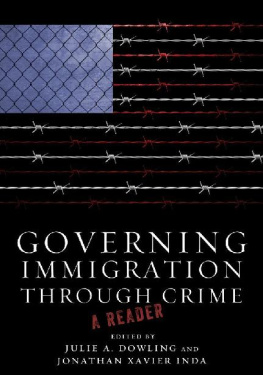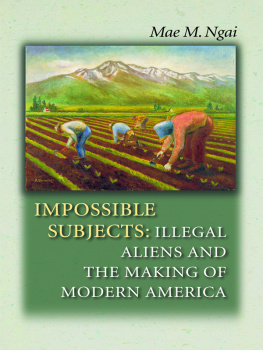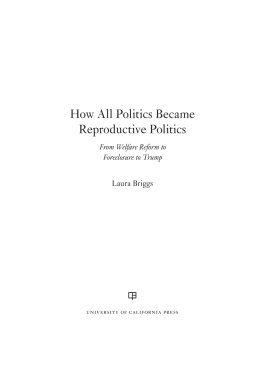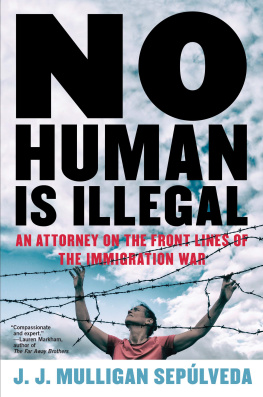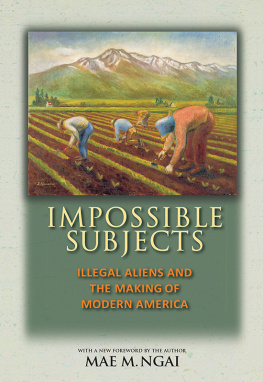Thank you for buying this ebook, published by NYU Press.
Sign up for our e-newsletters to receive information about forthcoming books, special discounts, and more!
Sign Up!
About NYU Press
A publisher of original scholarship since its founding in 1916, New York University Press Produces more than 100 new books each year, with a backlist of 3,000 titles in print. Working across the humanities and social sciences, NYU Press has award-winning lists in sociology, law, cultural and American studies, religion, American history, anthropology, politics, criminology, media and communication, literary studies, and psychology.
Illegal, Alien, or Immigrant
Illegal, Alien, or Immigrant
The Politics of Immigration Reform
Lina Newton
NEW YORK UNIVERSITY PRESS
New York and London
www.nyupress.org
2008 by New York University
All rights reserved
Library of Congress Cataloging-in-Publication Data
Newton, Lina.
Illegal, alien, or immigrant : the politics of immigration reform /
Lina Newton.
p. cm.
Includes bibliographical references and index.
ISBN-13: 9780-8147-5842-7 (cl : alk. paper)
ISBN-10: 08147-5842-8 (cl : alk. paper)
ISBN-13: 9780-8147-5843-4 (pb : alk. paper)
ISBN-10: 08147-5843-6 (pb : alk. paper)
1. United StatesEmigration and immigration. 2. United States
Emigration and immigrationGovernment policy. 3. Immigrants
United States. 4. ImmigrantsGovernment policyUnited States.
I. Title.
JV6465.N498 2008
325.73dc22 2008008059
New York University Press books are printed on acid-free paper, and their binding materials are chosen for strength and durability.
Manufactured in the United States of America
c 10 9 8 7 6 5 4 3 2 1
p 10 9 8 7 6 5 4 3 2 1
Contents
Acknowledgments
The evolution of this book benefited from the support of several people. My husband, best friend, and scholar of American politics in his own right, Anthony Salvanto, deserves first mention. He brought a sharp and critical eye to the manuscript as I worked to clarify the main arguments. I am grateful to him for his uncanny ability to see clarity in spaces where I often see distracting complexity. He has been a wonderful (if sometimes captive) audience, and has served as a constant sounding board for my ideas. I am fortunate to have his intellectual and emotional support in all of my endeavors.
Three people have been elemental to ensuring that the project did not languish. Jane Junn at Rutgers University made herself available to read the inelegant versions and graciously shared her knowledge of American politics and literature on race, ethnicity, and immigration. I thank her for her humor and her generosity of time and spirit. Anne Schneider at Arizona State University was also a champion of the project, as was Helen Ingram, who has continued to be a valuable mentor. She is retiring this year, and I sincerely see my own professional successes as a tribute to her outstanding and unwavering support.
Others who deserve mention and thanks for their assistance with substantive and technical aspects of this project include Dan Tichenor from Rutgers University and my colleague at Hunter College, Andy Polsky, each of whom offered helpful critiques of the proposal. Ilene Kalish of New York University Press has been consistently enthusiastic about this project, and I appreciate her expert counsel and humor. I am likewise grateful to the anonymous reviewers whose insights and thoughtful criticisms served to improve the work.
This project required time to complete, and time is expensive. The production of the manuscript would not have been possible without funding from Hunter Colleges Gender Equity Project. I also benefited from funding from the City University of New Yorks PSC-CUNY grant program. In addition, I wish to thank Hunter College and the political science department for granting me the time to work on this book.
Finally, I am grateful for the unconditional support of my friends and family, and for the warm well wishes with which they responded when their inquiries into my progress were met all too often with almost. I would like especially to thank my sister, Windie. She has been ready with words of encouragement at each step of the way.
A Note on Terminology
In this book I employ the term illegal immigrant to describe immigrants of any nation who have entered the United States or remained in the United States unofficially. Thus, I use illegal interchangeably with the descriptors unofficial, unauthorized, and illicit when discussing the immigration activities or status of those people who have entered or overstayed without official federal recognition. While I recognize that the term undocumented is often favored for political reasons (and grammatical reasons, since the word illegal is an adjective that technically describes actions or things, but not people), the term undocumented often proves problematic in a policy analytic context. Since the passage of the 1986 Immigration Reform and Control Act many immigrants who are in the country unofficially are, in fact, documentedalthough they may have false social security numbers, alien cards, and so on. The reality of false documentation provides its own set of policy problems that would not be captured by the term undocumented. Likewise, readers will note from the titles of the numerous government and scholarly studies listed in the bibliography that my use of the term illegal immigrant often simply reflects its widespread use in official reports, journalistic accounts, and academic research.
Finally, and most importantly, this is a study of publicly oriented official rhetoric offered in support of government policy. Exploring how elected officials speak of immigration issues, the book presents and analyzes symbolic language, or specific iterations of immigration imagery and narrative structures; this endeavor requires that I pay attention to political language as it appears in official records. However, I have produced this book as an effort to show how official rhetoric ensures that policy nomenclature is often not politically neutral, and to provide critical analysis of immigration discourse where warranted.
Introduction
The Power of a Good Story
Let me state the following premise about which there is little disagreement. It is the obligation of the Federal Government to secure the borders of the Nation from illegal entry and unauthorized invasion.... It is not a question of being anti-immigration. This country was founded by immigrants. I am the son of one of them.
Rep. Steven Horn (R-CA), August 9, 1996
In these opening remarks to a hearing on federal border control efforts, immigrants appear simultaneously as villainous invaders of the nation and as its heroic founders. That Americans view and treat the immigrant population with both veneration and fear is an accepted peculiarity of the nations history. However, Congressman Horns remarks also reveal four themes that have become the hallmarks of contemporary discourse on immigration policy, which blends old and new sensibilities about the benefits and harms of immigration to the nation. For example, Mr. Horn reminds his audience that the only entity with the power to engage in national defense is the federal government. This first theme, the tendency in political discourse to describe immigration with the crisis language of war and invasion, is as old as the immigration phenomenon.


